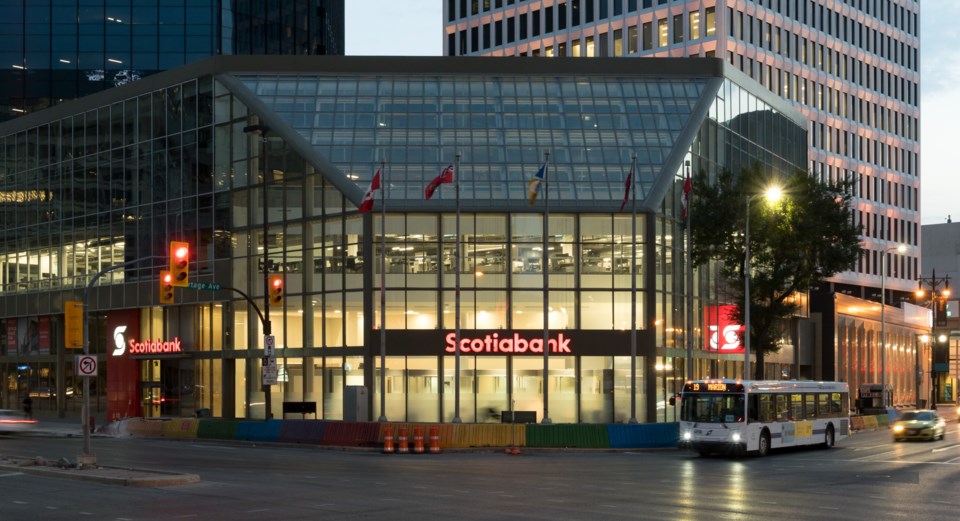A new report by brokerage CBRE Ltd. forecasts a “pivotal” year for the Winnipeg office market in 2023 as a tide of older, less desireable space returns to the market with Wawanesa Mutual Insurance Co.’s relocation and consolidation of its space requirements in new premises at True North Square.
“The insurer is consolidating several Class B locations in the downtown area, all of which will be coming back to the market,” CBRE reported in its market outlook released at the end of February. “That will add some 300 bps of vacancy to the market in one fell swoop.”
The current downtown vacancy rate is 15.7 per cent, meaning the return of Wawanesa’s existing space to the market could push the rate to upwards of 18.7 per cent. The new 300,000-square-foot tower is set to complete this fall, with lease agreements meaning space at Wawanesa’s four existing locations will come available Jan. 1, 2024.
“It’s apparently ahead of schedule, so they could be in there sooner,” said Paul Kornelson, vice-president and managing director with CBRE in Winnipeg.
While the city’s downtown office market has seen positive absorption in recent quarters, Wawanesa’s move will impact the market similarly to the first office tower at True North Square, a 365,000-square-foot building that completed in 2018.
“We still hadn’t quite settled down from reshuffling when COVID hit two full years later, so it’s certainly going to cause a disruption again,” he said.
CBRE’s current forecast anticipates an ongoing return of office workers to downtown will see vacancies end 2023 at 17.7 per cent, however, suggesting a muted impact from Wawanesa’s move.
“A federal government policy that requires employees to be in the office two to three days a week as of March 31 should help to offset rising vacancies,” CBRE reported. “Winnipeg’s downtown vibrancy hinges on the commuting workforce coming into work on a daily basis, and so the government announcement is a positive development for the city centre.”
The federal government commited to 80,000 square feet at City Place (234 Donald) last year, which is now fully leased. Recent deals have also seen 200 Portage, a five-storey building in the core totalling 95,000 square feet, lease up from being less than half full a year ago. The Winnipeg Chamber of Commerce, World Trade Centre Winnipeg and CentrePort Canada Inc. have leased shared space on the first two floors, while accounting firm Grant Thornton LLP has taken a floor and will leave its suburban premises later this year.
“You’re seeing a migration of companies to the core, including one from the suburbs that’s now coming to downtown,” Kornelson said.
The new leases are often driven by upgrades and renovations that have repositioned the properties for the post-pandemic era. This includes greater amenities and arrangements that respect the hybrid work environment that has become common as workers take advantage of greater leeway to work from home.
A recent study by Cushman & Wakefield in the U.S. determined that such adjustments will be key to retaining a viable stock of office space through the end of the decade.
The study estimated that the U.S. office inventory will approach 5.7 billion square feet by 2030. But the persistence of hybrid work arrangements mean office requirements will total just 4.6 billion square feet, a difference of about 1.1 billion square feet.
“The overall level of vacancy will therefore be 55 per cent higher than was observed prior to the pandemic,” Cushman & Wakefield reported.
Just 852 million square feet of the total inventory in 2030 will qualify as highly desireable, while 1.4 billion square feet will need to be reimagined in order to compete in a dramatically more competitive market.
The challenge is being met in Winnipeg through a number of small investments that add up to significant tenant appeal.
“It’s very basic things, like upgrading elevator cabs and lobbies, and having a fitness facility,” Kornelson said. “Those seem very basic, but just having a combination of one or a couple of things can really elevate a B or C class building.”
The disruption that followed the completion of the first tower at True North Square in 2018 helped set current investments in motion.
“[That] set in motion the concept of flight to quality, and landlords reinvesting in their space,” Kornelson said. “Buildings that aren’t being reinvested in, long-term they’re going to be left behind.”
A case in point is 200 Portage. In 2020, after Scotiabank left for True North Square, PCL Construction undertook a whole-building revitalization and office fit-out for the owner with a view to “providing attractive accommodations for future tenants while ensuring the 40-year-old building’s envelope was brought up to present day standards.”
“It’s been a full conversion from effectively a single-tenant building into a multi-tenant building, and we’ve really seen that leasing activity pick up in the last six to nine months,” said Trevor Clay, principal with Capital Commercial Real Estate Services Inc., which has handled leasing. “It’s been great to see some major tenants make commitments.”



